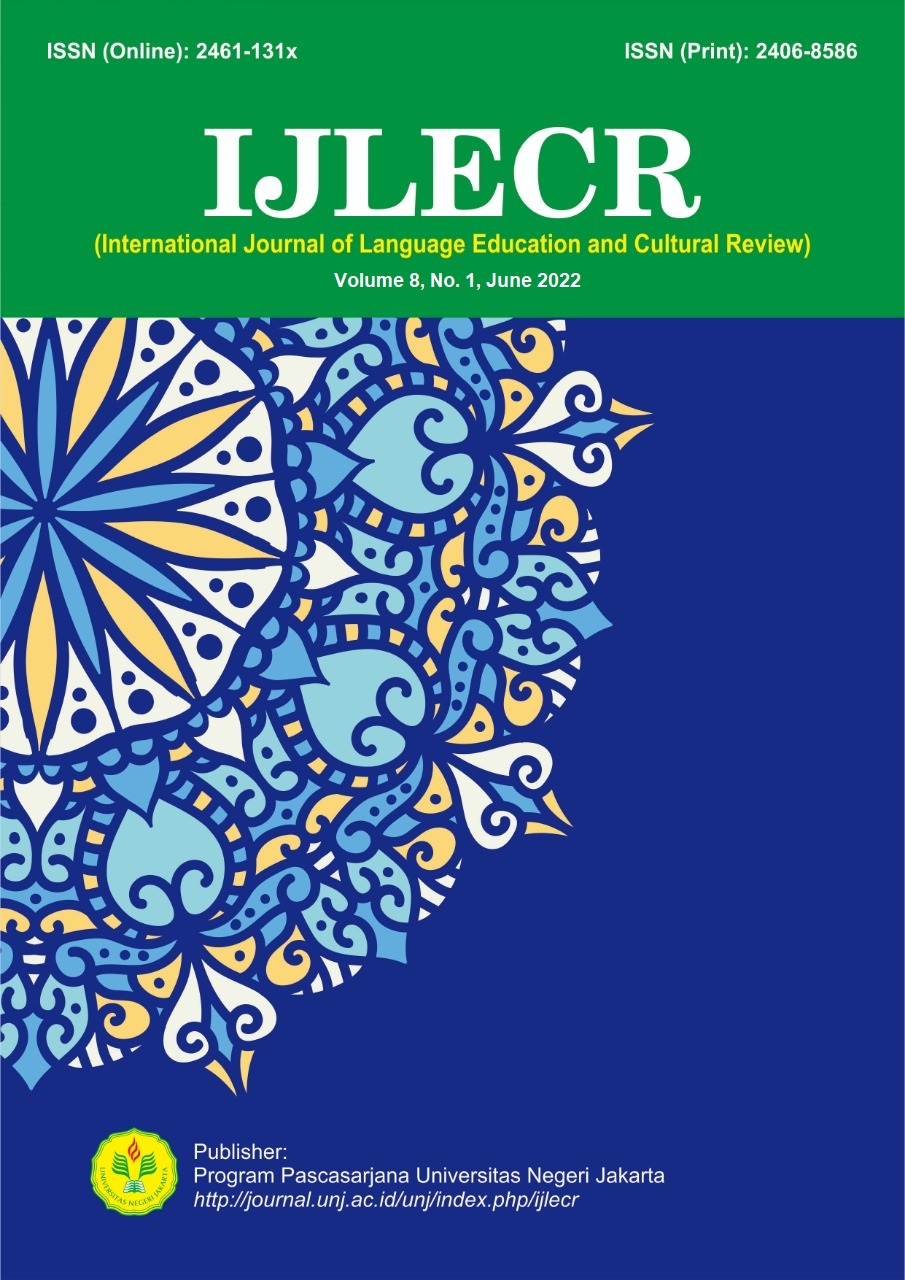STUDENTS’ METACOGNITIVE STRATEGIES AWARENESS AND SPEAKING ABILITY: A CORRELATIONAL STUDY
Abstract
The primary aim and the focus of this study were to investigate students’ metacoginitive strategies awareness and their relationship with speaking ability. The participants were 31 Indonesian junior college students who have taken speaking course. The study gained that students’ metacognitive strategies awareness was categorized on good awareness with 77.9 % of use. Following that, the research used Correlational Research design and found that there was a positive correlation between the variables. In addition, the correlation was categorized in strong association. It meant that students’ level of awareness in planning, monitoring, managing, solving and evaluating the learning process in order to reach the goal significantly affect their ability.
References
Abdellah, R. (2015). Metacognitive awareness and its relation to academic achievement and teaching performance of pre-service female teachers in Ajman University in UAE. Procedia - Social and Behavioral Sciences (174). https://www.sciencedirect.com/science/article/pii/S1877042815007582
Aglina, E, F & Syamsiah, R, N. (2020). The Correlation between Students’ Metacognitive Awareness and Their Anxiety in Writing Performance. English Education: Jurnal Tadris Bahasa Inggris. 13 (1). http://ejournal.radenintan.ac.id/index.php/ENGEDU/article/view/6594
Akbarzadeh M., Tajadini M., & Haddad, N, M. (2020). Metacognitive Awareness Instruction: A Mixed Method Study on High School EFL Learners’ Writing Development. Propósi-tosy Representaciones, 8 (SPE3).
Baker, L & Brown, A, L. (1980). Metacognitive Skills and Reading. Technical Report. https://eric.ed.gov/?id=ED195932
Brown, H, D. (1990). Principles of Language Learning and Teaching. San Fransisco: Pearson.
Cakici, D. (2018). Metacognitive Awareness and Critical Thinking Abilities of Pre-service EFL Teachers. Journal of Education and Learning, 7(5). https://www.ccsenet.org/journal/index.php/jel/article/view/75302
Dabarera, C., Renandya, W, A., & Zhang, L, J. (2014). The impact of metacognitive scaffolding and monitoring on reading comprehesnsion. System, 42 (2). https://www.sciencedirect.com/science/article/pii/S0346251X14000025
Dangin. (2020). Students’ Awareness of Metacognitive Reading Strategies in Academic Reading. Journal of English Teaching and Learning Issues, 3 (1). https://journal.iainkudus.ac.id/index.php/jetli/article/view/7145
Donndelinger, Stephen, J. (2005). Integrating Comprehension and Metacognitive Reading Strategies. In Susan, E, I., Cathy, C, B., Kathryn, L, B & Kathryn, K, W. (Eds). Metacognition in Literacy Learning: Theory, Assessment, Instruction, and Professional Development, . London: LEA Publishers.
Flavell, John, H. (1979). Metacognition and Cognition Monitoring: A new Area of Cognitive- Development Inquiry. American Psychologist, 34 (10), https://psycnet.apa.org/record/1980-09388-001
Garret, J., Alman, M., Gardner, S & Born, C. (2007). Assessing Students’ Metacognitive Skills. American Journal of Pharmaceutical Education, 71 (1), https://www.ncbi.nlm.nih.gov/pmc/articles/PMC1847545/
Jacobs, J. E & Paris, S. G. (1987). Children’s Metacognition About Reading: Issues in Definition, Measurement, and Instruction. Educational Psychologist, 22(3), https://www.tandfonline.com/doi/abs/10.1080/00461520.1987.9653052
Jayapraba, G & Kanmani, M. (2013). Metacognitive Awareness in Science Classroom of Higher Secondary Students. International Journal on New Trends in Education and Ther Implication, 4(3).
Jo An, Y & Cao, L. (2014). Examining the Effects of Metacognitive Scaffolding on Students' Design Problem Solving and Metacognitive Skills in an Online Environment. Journal of Online Learning and Teaching, 10(4).
Latifa, A., Rahman, A., Hamra, A., Jabu, B & Nur, R. (2015). Developing a Practical Rating Rubric of SpeakingTest for University Students of English in Parepare, Indonesia. English Language Teaching, 8(6). https://eric.ed.gov/?id=EJ1075464
Lapele, D, A. (2022). Metacognitive Awareness Inventory (MAI) Students in Online Learning. Education & Learning Journal, 29 (1). http://journal2.um.ac.id/index.php/jpp/article/view/22414
McDowell, P, E. (2015). Thinking about Thinking: Cognition, Science and Psychotherapy. New York: Routledge.
Özçakmak, H., Köroğlu, M., Korkmaz, C. & Bolat, Y. (2021). The effect of metacognitive awareness on academic success. African Educational Research Journal, 9(2). https://eric.ed.gov/?id=EJ1297101
Richards, J.C. (2008). Teaching listening and speaking: From theory to practice. Cambridge: Cambridge University Press.
Sabnani, R & Goh, C. (2021). Developing Young Learners’ Metacognitive Awareness for Speaking. TESOL Quarterly. https://onlinelibrary.wiley.com/doi/abs/10.1002/tesq.3042
Schraw, G. & Dennison, R.S. (1994). Assessing metacognitive awareness. Contemporary Educational Psychology, 19(4). https://www.sciencedirect.com/science/article/abs/pii/S0361476X84710332
Schraw, G & Moshman, D. (1995). Metacognitive Theories. Educational Psychology Review, 7, 351–371, https://link.springer.com/article/10.1007/BF02212307
Urban, M, K., Pesout, O., Kombrza, J & Urban, M. (2021). Metacognitively aware university students exhibit higher creativity and motivation to learn, Thinking Skills and Creativity, 42, https://www.sciencedirect.com/science/article/abs/pii/S1871187121001784
Zarrabi, F. (2017). Investigating the Relationship between Learning Style and Metacognitive Listening Awareness. International Journal of Listening, 34(1), https://www.tandfonline.com/doi/abs/10.1080/10904018.2016.1276458





